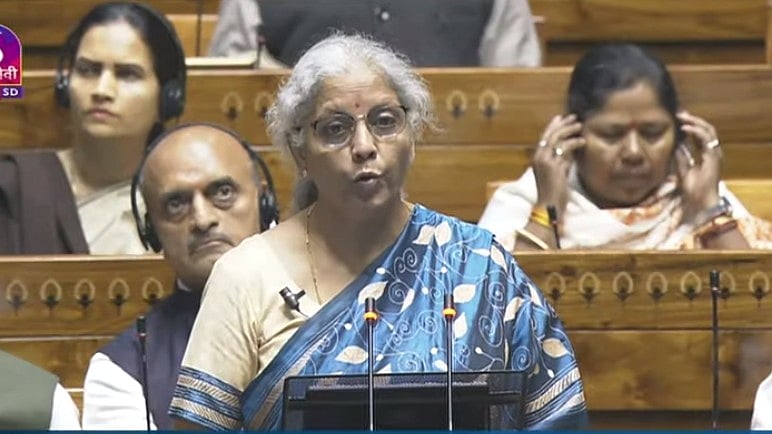
Nirmala Sitharaman.
Credit: Sansad TV screengrab
Income Tax Bill Updates | Simplified version brings in 'tax year' concept; omits 'previous year' and obsolete clauses
The Income Tax Bill, 2025, will replace 298 sections and 14 schedules in the six-decade old voluminous legislations, with a 622 page new law enshrined in 526 section.
Currently, for income earned in the previous year (say 2023-24), tax is paid in assessment year (say 2024-25). This previous year and assessment year concept has been removed and only 'tax year' under the simplified bill has been brought in.
Public inputs and suggestions had earlier been invited in four categories: simplification of language, litigation reduction, compliance reduction, and redundant/obsolete provisions. The income tax department has received 6,500 suggestions from stakeholders on review of the Income Tax Act.
Read more
Income Tax Bill Updates | Insurance industry expects that the new bill increases the existing deductions available for life and health insurance premiums
Income Tax Bill Updates | New Bill is likely to become law by April 1, 2026
Income Tax Bill Updates | Here's what to expect in new bill
As per the proposed law, clearer tax treatment on stock options (ESOPs) have been included for reduced tax disputes and includes judicial pronouncements of the last 60 years for more clarity.
As per new law, the CBDT can now frame tax administration rules, introduce compliance measures, and enforce digital tax monitoring systems without requiring frequent legislative amendments as per the Clause 533.
Read more
Income Tax Bill Updates | Govt lists Income-Tax Bill, 2025 for introduction in LS on Thursday
The government has listed a bill to consolidate and amend the law relating to income-tax for introduction in the Lok Sabha on Thursday.
According to the agenda circulated by the Lok Sabha secretariat on Wednesday, Finance Minister Nirmala Sitharaman will introduce the Income-Tax Bill, 2025.
The much-anticipated Bill will replace terminologies like assessment and previous year with easier to understand 'tax year' as part of move to simplify language while removing provisos and explanations.
Income Tax Bill Updates | Will the new Income Tax continue offering tax rebates under Section 87A of the Income Tax Bill, 1961?
While presenting the Budget 2025, FM Sitharaman had pointed out that the government is planning to increase the rebates offered under Section 87A from Rs 25,000 to Rs 60,000 under the new Income Tax law.
The rebate covered under 87A of the I-T law has been continued under Clause 156 of the new I-T bill, as per an expert.
Income Tax Bill Updates | Will there be changes to filing dates when the new I-T bill becomes law?
According to experts, there will be no change in due dates for filing income tax returns as per the new I-T bill. They will remain the same:
Individuals- 31st July
Companies- 31st October
Tax Audit Cases-31st October
Transfer Pricing Cases - 30th November
Revised Return - 31st December [9 months from the end of relevant Tax Year or before the completion of assessment, whichever is earlier]
Income Tax Bill Updates | Comparison of Standard Deduction limits: Income Tax Act, 1961 vs Income Tax Bill, 2025
| Aspect | Income Tax Act, 1961 | Income Tax Bill, 2025 |
|---|---|---|
| Standard Deduction Amount | ₹50,000 | ₹75,000 |
| Applicability | Salaried employees and pensioners | Salaried employees and pensioners (same eligibility, higher deduction) |
| Additional Benefit for Senior Citizens | No extra benefit (flat ₹50,000) | Likely higher deduction for pensioners above 60 (awaiting confirmation) |
| Exemption for Business Income Earners? | Not available | Still not available |
| Effect on Taxable Income | Reduces taxable salary income by ₹50,000 | Higher deduction (₹75,000) further lowers taxable salary income |
Income Tax Bill Updates | Key Changes in Mutual Fund taxation under Income Tax Bill, 2025: A comparison
| Aspect | Income Tax Act, 1961 | Income Tax Bill, 2025 |
|---|---|---|
| Tax Deduction for Mutual Fund Investments | No specific deduction for investing in mutual funds (except ELSS funds under Section 80C). | Still no general tax deduction for mutual fund investments, but ELSS under 80C continues. |
| Tax on Debt Mutual Funds | Long-Term Capital Gains (LTCG) taxed at 20% with indexation if held for 3+ years. | Indexation benefit removed. Gains now taxed as per individual slab rates, even if held long-term. |
| Tax on Equity Mutual Funds | LTCG over ₹1 lakh taxed at 10% (without indexation). | No change – remains at 10% on LTCG exceeding ₹1 lakh. |
| Mutual Fund Consolidation | Mergers within the same category were generally tax-neutral, but lacked clear legal backing. | Explicitly tax-neutral if the consolidation is within the same fund category. |
| Market-Linked Debentures (MLDs) | LTCG taxed at 10% without indexation if held for 1+ year. | Always treated as short-term capital gains (STCG) and taxed at slab rates. |
| Specified Mutual Funds (Debt-heavy Funds) | LTCG at 20% with indexation after 3 years. | Always taxed as short-term capital gains (STCG), regardless of holding period |
Income Tax Bill Updates | Nirmala Sitharaman tables Income Tax Bill, 2025 in Lok Sabha
Income Tax Bill Updates | Oppn walks out while FM presents Income Tax Bill, 2025
Income Tax Bill Updates | 4,000 amendments made from previous Act
Income Tax Bill Updates | Number of words have come down by half: FM
Income Tax Bill Updates | What next?
The Bill will now be sent to a review committee, which will suggest changes and sent back the same to the government. After this, cabinet ministers will consider the recommendations and send the bill back to the Parliament.
